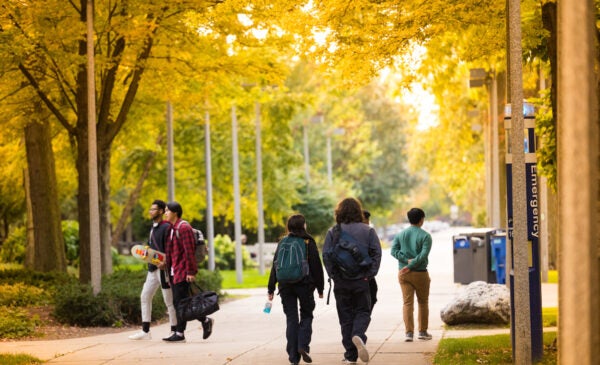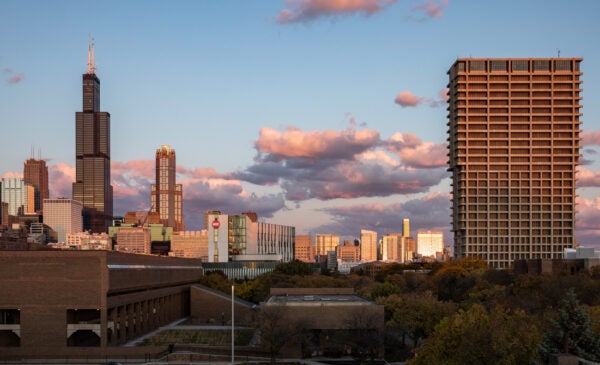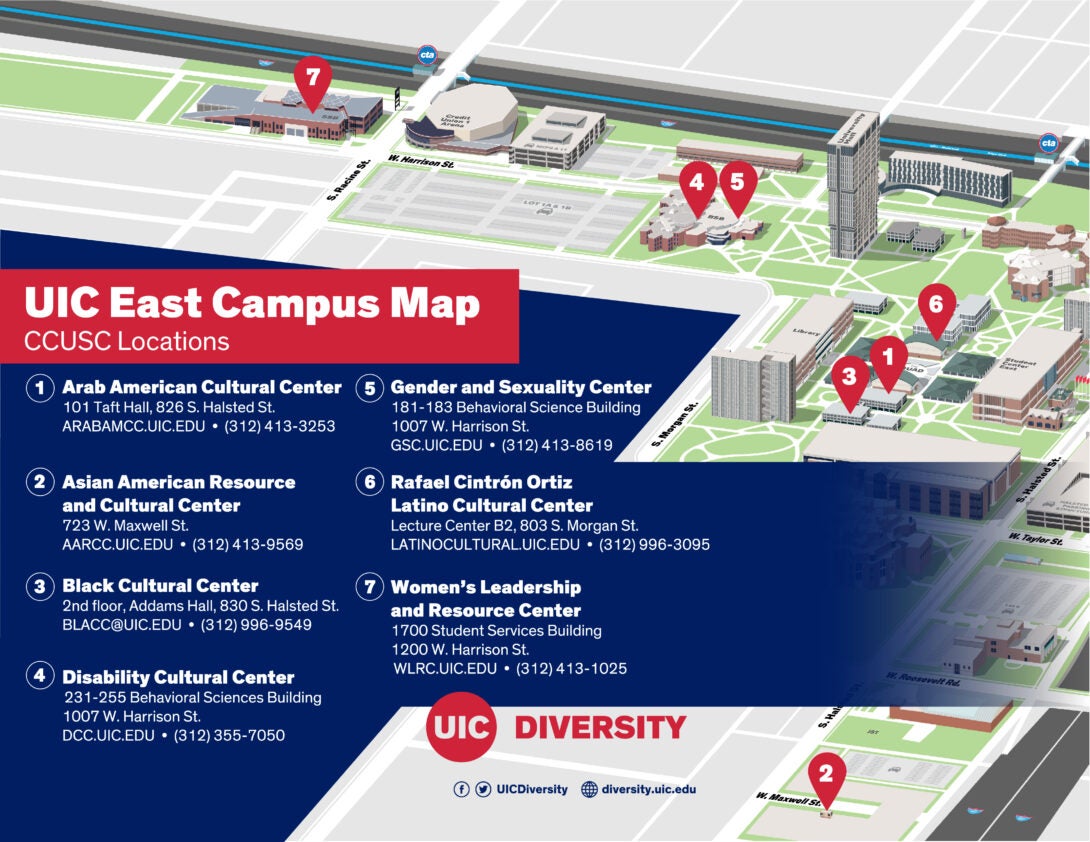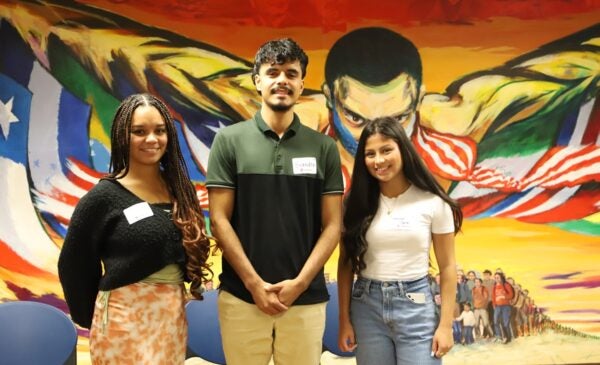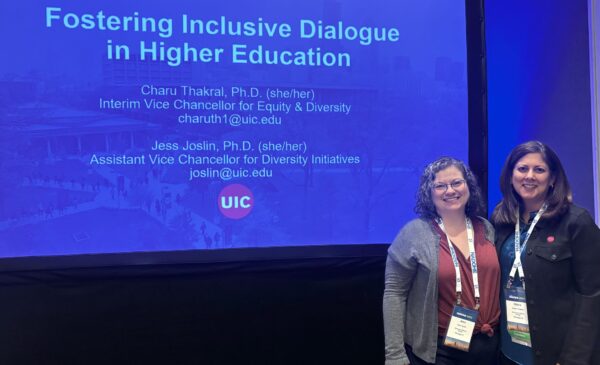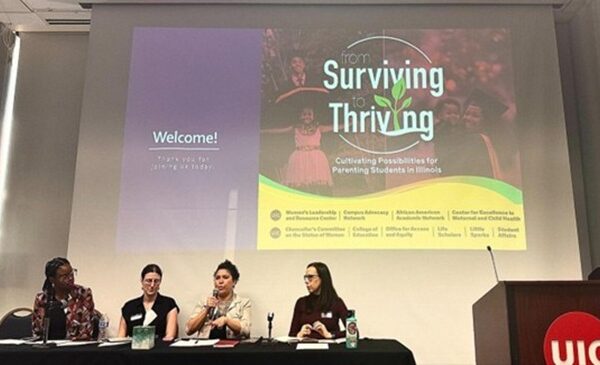Centers for Cultural Understanding and Social Change
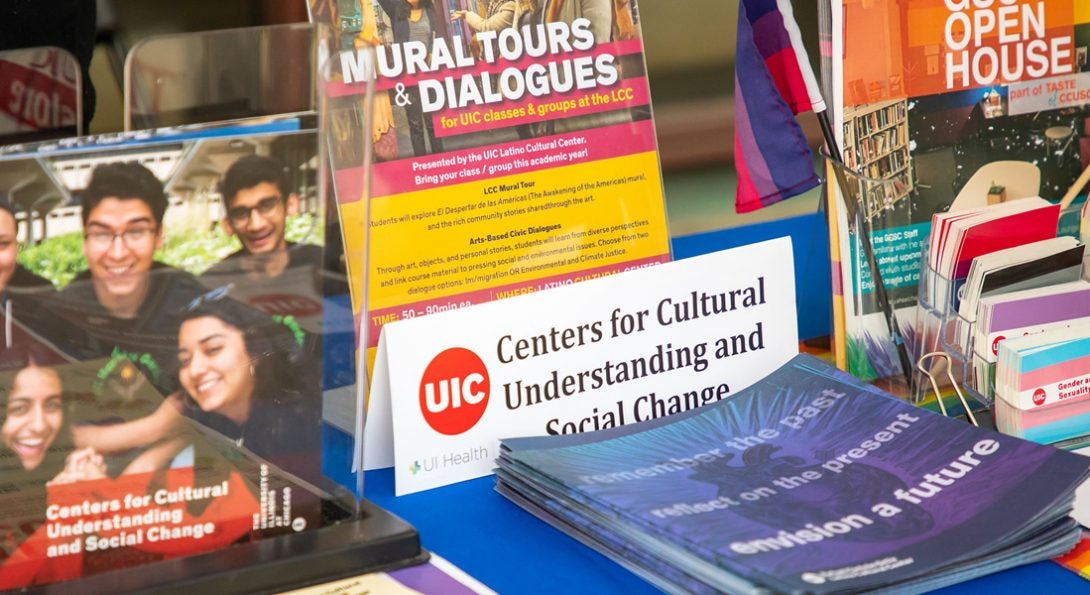
Who We Are - Collective CCUSC Statement
Founded as a direct result of campus activism, the UIC Centers for Cultural Understanding and Social Change (CCUSC) work collectively to produce knowledge and shift university culture, validating the multidimensional lived experiences of historically and currently excluded communities. Informed by social justice frameworks, the Centers support students, faculty, and staff as they build a strong identity and sense of belonging, becoming change agents for a more just campus and society. The Centers connect our communities and design intercultural and engaged-learning opportunities, student mentorship programs, cultural programming, advocacy, collaborative research, and community partnerships. Through these efforts, the Centers expand the educational and transformational mission of UIC.
Events from the CCUSC
Submit an Event!
x
CCUSC
Use the tabs below to zoom in on the map and find more information on each center.
1. Arab American Cultural Center
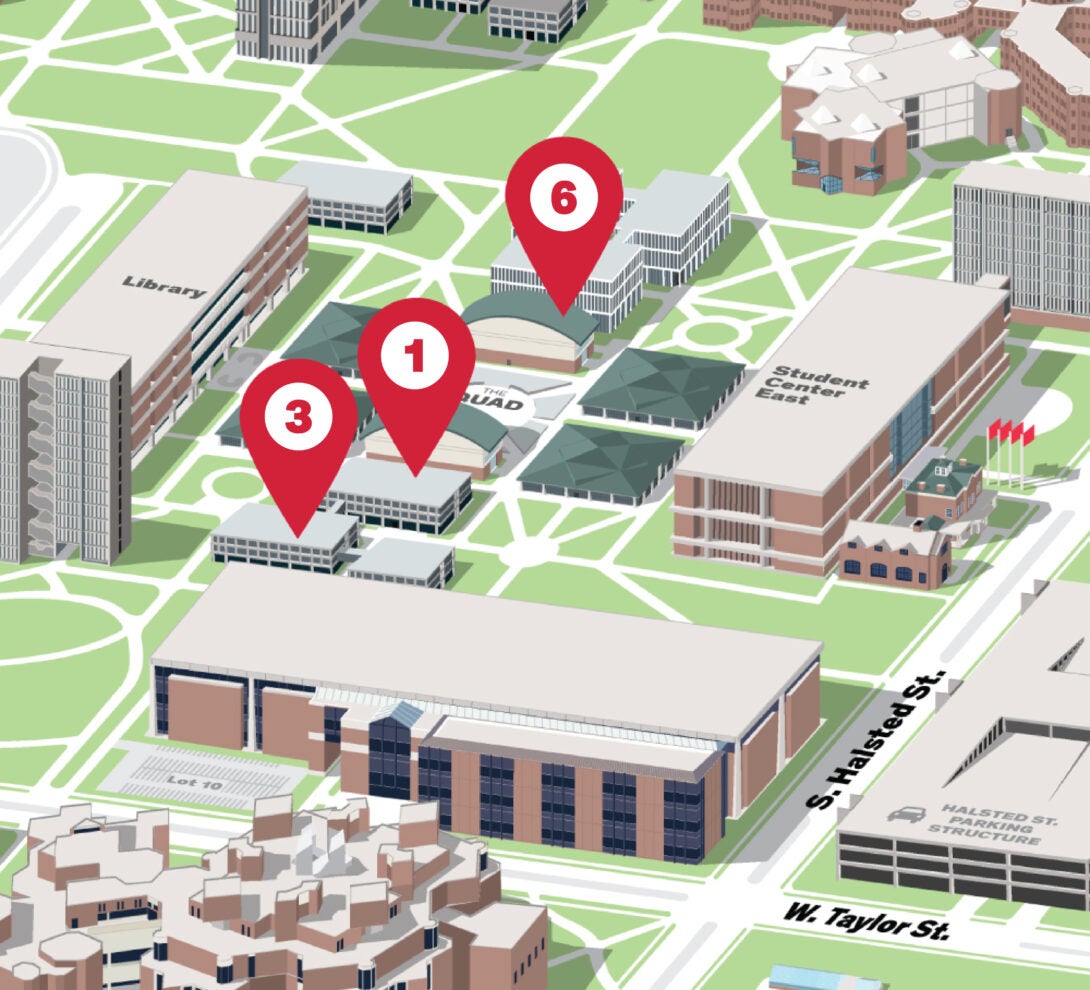
Established by student-led efforts in 2016, the Arab American Cultural Center (ArabAmCC) is the first Arab-based cultural center on a college campus in the United States. It seeks to affirm the diverse needs of Arab American students, increase awareness about Arab American and Muslim American cultures and histories, and build community, solidarity, and brave spaces to promote social justice and equality and cherish cultural diversity.
Initiatives/Programs
- Strengthens campus communities’ understanding and knowledge of Arab and Muslim cultures through artistic and cultural exhibits and programs, facilitated discussions, public educational events, and community-building programs.
- Research, archive, and educate on the history and current realities of Arab and Arab American student activism for social justice across US campuses through our Storytelling and Qisassna programs.
- Collaborate with Faculty and Community Organizations to build stronger knowledge base of lived realities and experiences of Arab and Arab American/ MENA/SWANA communities through research projects and Arab American Heritage Month programming.
- Build Arab and Muslim students’ capacity, learning, and leadership skills through internships, trainings, Summer Leadership Institute, and direct support.
Contact:
101 Taft Hall
826 S. Morgan St.
Website: arabamcc.uic.edu
Call: 312-413-3253
2. Asian American Resource and Cultural Center
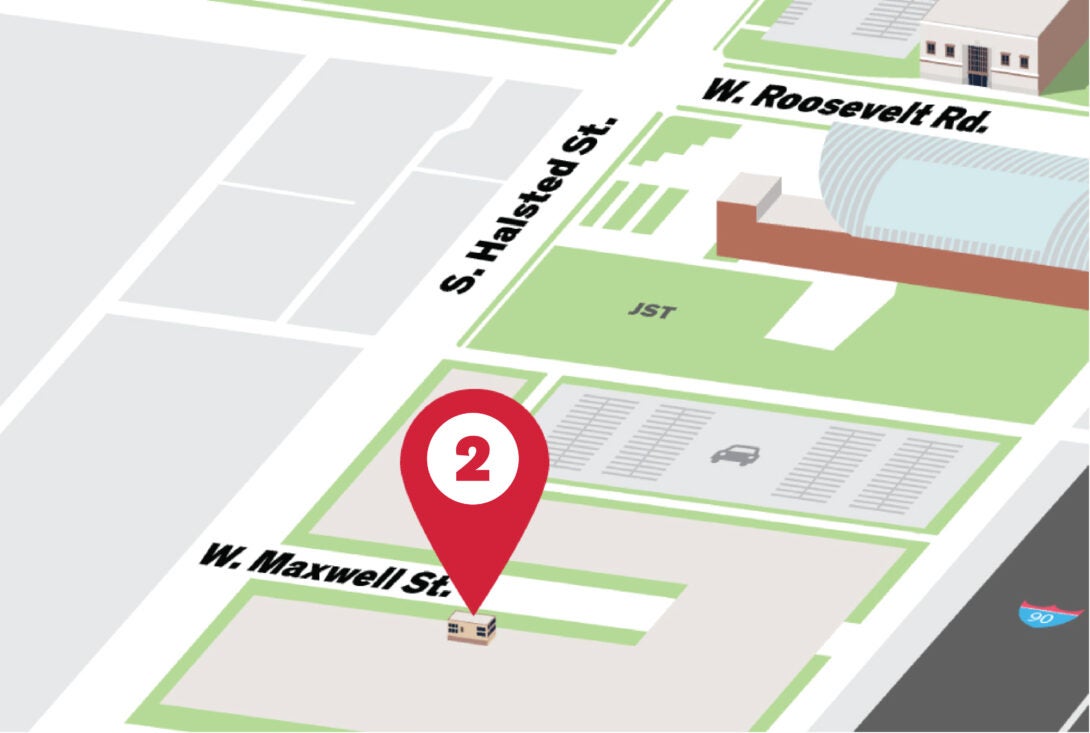
The Asian American Resource and Cultural Center (AARCC) opened in Spring of 2005 as a result of student efforts to ensure that UIC supports the needs of Asian Americans. AARCC promotes the intellectual and personal growth of UIC students, staff, and faculty; advocates for greater access, equity, and inclusion of Asian Americans; and educates the UIC community about Asian Americans.
- Offers social, cultural, and educational programs that promote knowledge of and fosters engagement with issues relating to Asian Americans and Asian American Studies.
- Develops co-curricular programs that enhance the UIC experience and provide opportunities for integrated learning and development.
- Collaborates and consults especially with Global Asian Studies (GLAS) and UIC’s Asian American and Native Pacific Islander-Serving Institution (AANAPISI) Initiative, the Asian American Student Academic Program (AASAP), as well as with other campus units, and serves as a resource for the campus to engage with Chicago’s Asian American communities and organizations.
Contact:
723 W. Maxwell
Website: aarcc.uic.edu
Call: 312-413-9569
3. Black Cultural Center

Founded in 1990, the Black Cultural Center (BCC) is a place to gather, learn, share and explore the diverse histories, cultures, and arts of people of African descent in the United States and around the world. We dedicate ourselves to building a supportive community for Black students and exploring the vibrant and diverse cultures that make up the African Diaspora. Four pillars guide the work we do at the BCC: Building Community, Exploring the Diaspora, Celebrating our Cultures, and Envisioning Justice.
BCC Programs and Initiatives are varied and vibrant. We:
- Curate events that explore the diverse set of histories and experiences that shape our Black community at UIC and our communities beyond the university.
- Develop and sponsor arts initiatives such as exhibitions, performances, film screenings, open mic poetry readings and storytelling workshops.
- Support the development of student leadership skills through internships, student-initiated program development, and our annual Black Student Leadership Conference.
- Collaborate with the Black Studies Department and other campus units to deepen campus knowledge about the histories, cultures and experiences that define the Black Diaspora.
- Build social justice-focused community partnerships and invite students to collaborate with our community partners.
Contact:
2nd floor, Addams Hall
830 S. Halsted St.
Website: blacc.uic.edu
Call: 312-996-9549
4. Disability Cultural Center
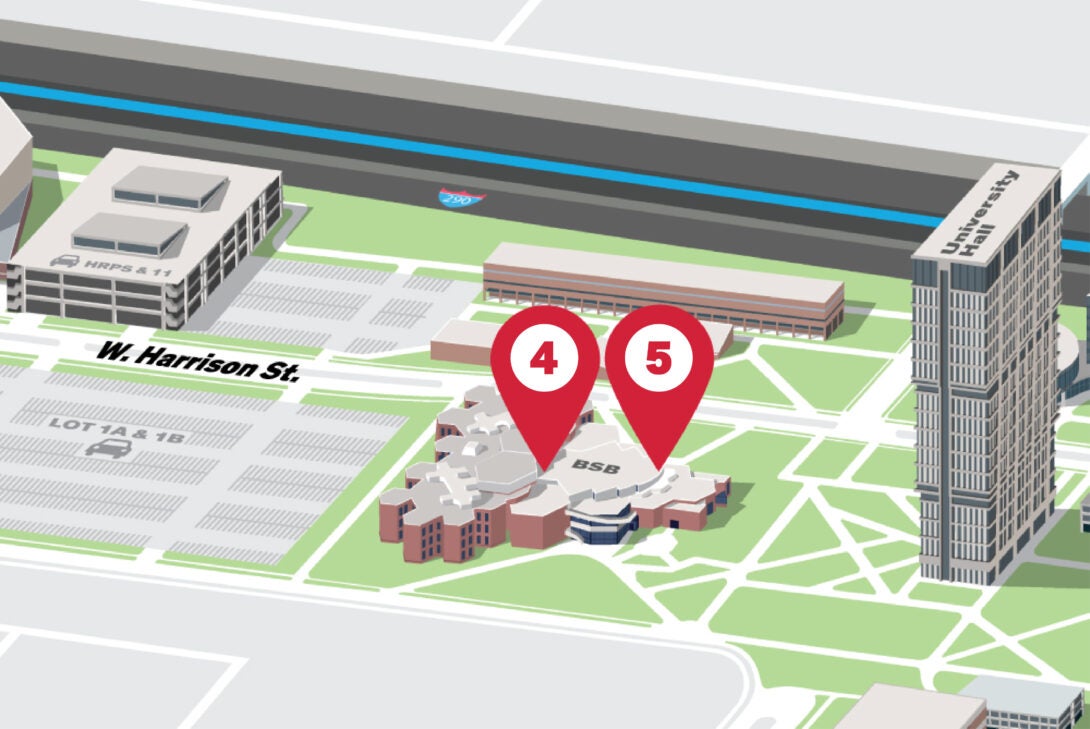
The Disability Cultural Center (DCC) was established as one of UIC’s seven Centers for Cultural Understanding and Social Change in the Spring of 2018. One of the first centers of its kind, the DCC owes its existence to campus activism. We are dedicated to fostering a sense of belonging for disabled people, exploring interlocking social justice struggles, and centering disabled creativity and wisdom to imagine more accessible, just futures. Moving beyond purely medicalized, individualizing takes on disability, we are grounded in understandings of disability that recognize it as a site for community, identity, activism, and culture.
We work to:
- Bolster our campus communities’ understanding of ableism and disability culture perspectives, disability history, and the contributions of disabled artists, organizers, and thought leaders.
- Collaborate with our sibling Centers for Cultural Understanding and Social Change to offer programs that explore the intersections of disability experience with race and ethnicity, gender, sexuality, social class, migration, relationship to settler colonialism, faith traditions, and more.
- Create a range of possible engagement opportunities and community-building spaces, like one-on-one check ins, drop-in social spaces, public events, and more in-depth internship opportunities.
- Foster relationships with organizations committed to promoting intersectional understandings of disability experience and culture in Chicago, in Illinois, and beyond.
Contact:
231 & 235 Behavioral Science Building
1007 W. Harrison St.
Website: dcc.uic.edu
dcc@uic.edu
312-355-7050
5. Gender and Sexuality Center

Through the production, curation, and preservation of intersectional LGBTQIA+ culture, we aim to activate critical thinking, learning, and action on campus and beyond. The GSC offers engaged learning, advocacy, and community building for students, faculty, staff, and community members. Underlying the Center’s work is an understanding of intersecting identities and the multiple layers of diversity within LGBTQIA+ identities including race, ethnicity, class, disability, geography, immigration status, religious/spiritual affiliation, and many more. Our programs are designed to cultivate student success, promote research, expand opportunities for intercultural engagement, and build robust community partnerships.
Our spaces consist of the GSC Community Lounge (181 BSB), GSC Flex Space (183 BSB), and staff administrative offices (1172 & 1180 BSB).
- GSC is the oldest LGBTQIA+ center at a university/college within the city of Chicago.
- The GSC Community Lounge (181 BSB) is a dynamic space for UIC students, faculty, and staff to engage in thoughtful dialogue, take a moment to decompress, browse & check out books from the GSC library focusing on LGBTQIA+ themes, access computers & printing, study, work, socialize, and participate in special events.
- GSC Flex Space (183 BSB) is a multi-faceted space that functions as a an art gallery and general
hub for many communities to meet and interact with each other. The space has been used for classroom engagement, project team meetings, seminars, private interviews, audio and video recordings, brainstorming sessions, idea displays, organization meetings, quiet study, and much more. The space can be used informally by individuals throughout the day. - Annual programming and initiatives include:
- Open Houses in the Fall & Spring
- Therapy Groups for LGBQ and Trans/GNC Students
- Annual Lavender Graduation acknowledgement for LGBTQIA+ Graduates
- LGBTQIA+ Speakers Bureau
- Curation of the Out @ UIC List
Contact:
181-183 Behavioral Science Building
1007 W. Harrison St.
Website: gsc.uic.edu
Call: 312-413-8619
6. Rafael Cintrón Ortiz Latino Cultural Center

The Latino Cultural Center (LCC) engages campus and local communities to deepen understanding of the diverse cultural heritages and identities of Latinx, issues affecting their lives, and creative solutions they are using to improve community life. The LCC offers engaged learning co-curricular opportunities that feature cultural and artistic expressions, intercultural and civic dialogues, scholarly presentations, and first-voice stories.
- Offers social and environmental justice Civic Dialogues and Tours of our mural El Despertar de las Américas (the largest contemporary indoor mural in Chicago) to connect UIC courses material to community challenges and solutions.
- Connects UIC campus with community leaders, artists, and cultural institutions through public programs including: Zona Abierta, Civic Cinema, Noche de Poetas, ARTivism, and Special Programs.
- Coordinates and supervises internships for the Heritage Garden and lends its expertise in collaborative projects including L@S GANAS for STEM students.
Contact:
Lecture Center B2
803 S. Morgan St.
Website: latinocultural.uic.edu
Call: 312-996-3095
7. Women's Leadership and Resource Center
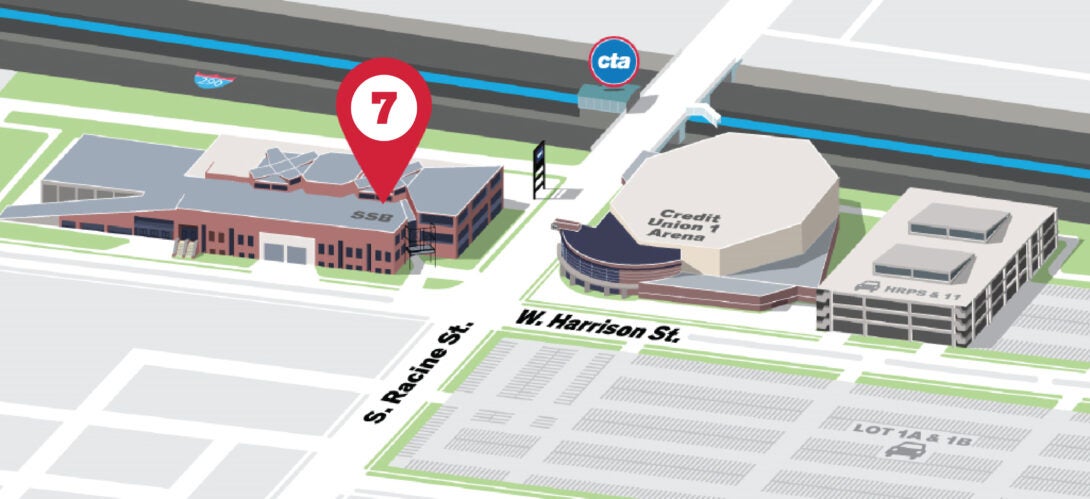
Through institutional interventions, support, advocacy, and education, our mission at the Women’s Leadership and Resource Center (WLRC) is to create a welcoming and equitable environment in which women are able to pursue their educational and career aspirations, free from institutional barriers, oppression, and violence.
- Hosts programs that highlight women’s lived experiences and recognize their contributions as contemporary, cultural and historical leaders.
- Promotes gender equity through programming that raises awareness of women’s and gender issues, develops women’s leadership, and celebrates women’s accomplishments and contributions.
- Provides resources as well as individual consultation on issues such as sexual harassment and sexual assault.
Contact:
1700 Student Services Building
1200 W. Harrison St.
Website: wlrc.uic.edu
Call: 312-413-1025
